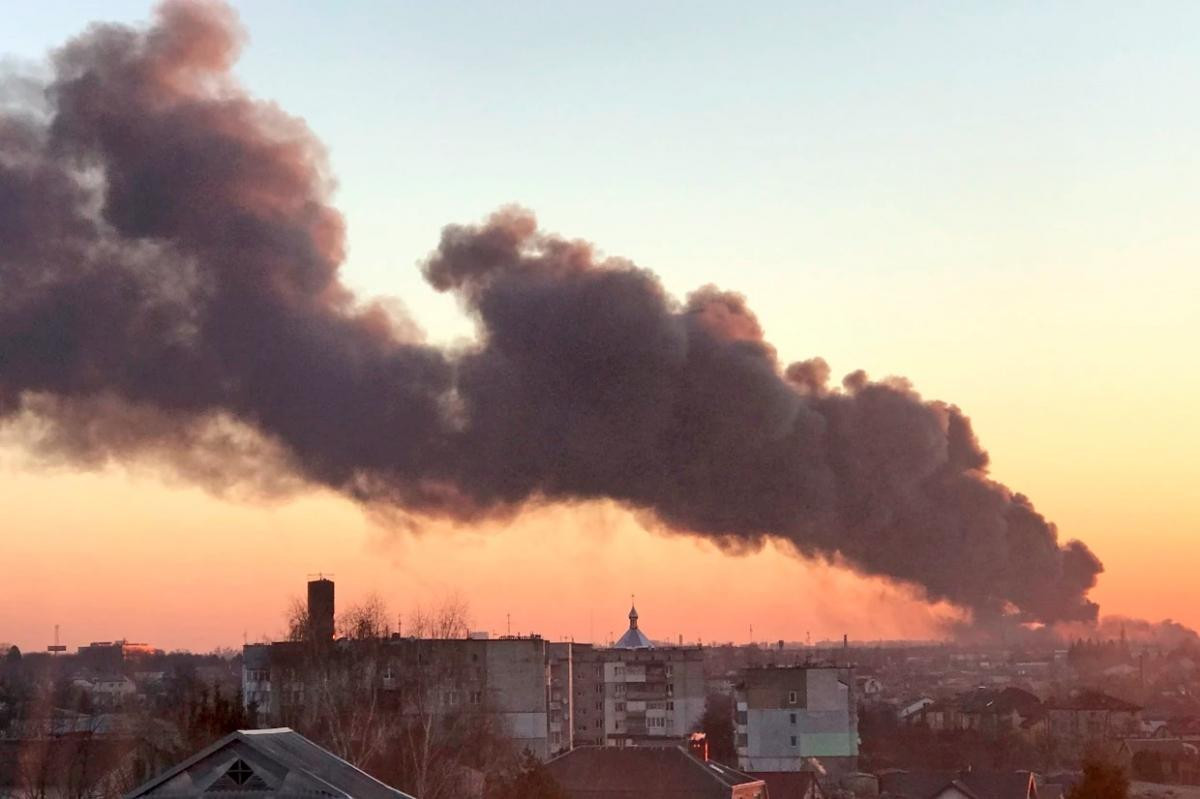The West fears nuclear war after Russia accuses Ukraine of plotting to use a 'dirty bomb'
After Russia warned that Ukraine might be preparing to use a “dirty bomb” (a bomb that emits radioactive material), Ukraine and the West are really concerned that this could be an excuse for Russia to use tactical nuclear weapons to create a breakthrough in the Ukraine conflict.
Russia warns of dirty bomb attack
Russian Defense Minister Sergei Shoigu called his counterparts in the US, UK, France and Türkiye on October 23, 2022, to warn that Ukraine may be preparing an attack with a “dirty bomb”.
A dirty bomb is generally understood to be a conventional explosive device packed with radioactive material. The purpose of such a weapon is to contaminate a large area, rendering it uninhabitable, possibly for a very long time.
Radioactive materials cannot be physically destroyed. They are usually securely buried in caverns deep underground so that they cannot leak into the soil or water.
 |
Smoke rises after an explosion in western Ukraine. Photo: AP. |
Russian media have published a series of articles making similar warnings, with claims that Russia has extensive intelligence on Ukraine's intentions and its capabilities to build radiological weapons.
In phone calls on October 24 with NATO countries, Chief of the General Staff of the Russian army Valery Gerasimov repeated the accusations made by Mr. Shoigu.
A radiological bomb is not a nuclear bomb, it does not have the explosive power of a nuclear bomb. However, it can cause public panic because it involves radioactive material like a nuclear bomb.
The West is worried and suspicious
In a statement, the US, UK and France confirmed that their defence ministers had spoken to Russian Defence Minister Shoigu and rejected Russia's accusations of a dirty bomb. The statement warned against using the dirty bomb allegation as a pretext to escalate tensions in Ukraine.
During a phone call on October 23, US Defense Secretary Lloyd Austin reportedly told Mr. Shoigu that Ukraine was not preparing a dirty bomb. The US defense chief warned that Russia was creating a pretext to justify the use of nuclear weapons in Ukraine.
White House Press Secretary Karine Jean-Pierre also issued a statement saying they were concerned about using the dirty bomb allegation as a pretext to increase tensions related to Ukraine.
US officials say concerns about Russia's use of nuclear weapons have increased.
In recent weeks, US President Biden's aides have closely studied the lessons of the 1962 Cuban Missile Crisis between the US and the Soviet Union.
For his part, on Twitter, Ukrainian Foreign Minister Dmytro Kuleba said that he had invited the International Atomic Energy Agency to Ukraine to confirm that the country was not making dirty bombs.
Looking back at the history of dirty bomb risks
In November 1995, Chechen rebels contacted a Russian television station and said they were preparing radioactive weapons. A bomb was discovered buried in Ismailovsky Park in Moscow. The bomb was made of high explosives and radioactive Cesium-137. The source of the radioactive material was never determined.
In 2002, an al-Qaeda member, Jose Padilla, was arrested in the United States for conspiring to build and detonate a radioactive weapon.
At the time of Ukraine's independence, it possessed about one-third of the Soviet Union's nuclear arsenal, including “130 UR-100N intercontinental ballistic missiles with six nuclear warheads each, 46 RT-23 Molodet intercontinental ballistic missiles with ten nuclear warheads each, as well as 33 heavy bombers, for a total of approximately 1,700 warheads.”
In 1994 (three years after seceding from the Soviet Union), Ukraine agreed to destroy its nuclear arsenal and receive nuclear guarantees under the Budapest Memorandum, whose signatories included Ukraine, Russia, the United States, and the United Kingdom.
After annexing Crimea in 2014, Russia deployed several nuclear-capable systems on the peninsula.
Field situation
Currently, the Kherson region (in Southern Ukraine) controlled by Russia has been evacuated, so the West is concerned that there may be some sudden change in this region, leading to the possibility of tactical nuclear weapons being activated.
The Russian Air Force has not yet achieved superiority in the air. On the ground, the Russian army has been recaptured by Ukraine in some areas. This fact makes the West think even more about the scenario that Russia will launch tactical nuclear weapons in response.
However, so far, US officials say they have seen no signs of Russia moving its tactical weapons (about 2,000 units).
However, these tactical weapons are small in size, so it is unclear whether US officials have seen them, although they may see or hear the activities of Russian forces trained in nuclear weapons.
Also on October 24, General Milley - Chairman of the US Joint Chiefs of Staff, spoke with Chief of the General Staff of the Russian army Gerasimov.
Speaking about this exchange, General Milley's spokesman, Colonel Dave Butler, later said: "The military leaders discussed a number of security-related issues of concern and agreed to maintain lines of communication"./.

.jpg)
